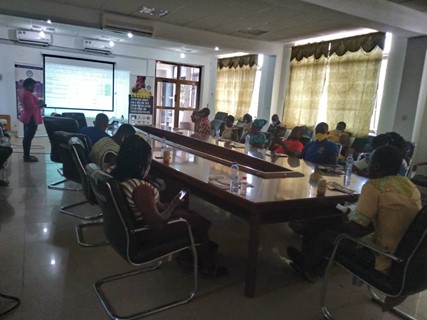The absence of decentralized state institutions is hindering access to essential services and justice by vulnerable communities in the Upper East Region, a study conducted by the Widows and Orphans Movement (WOM), a gender-focused organization has revealed.
The study showed that only the Department of Social Welfare was the most decentralized state institution and had offices in almost all the 15 Municipalities and Districts in the region while the rest did not.
The Executive Director of WOM, Fati Abigail Abdulai who made the findings known to stakeholders in Bolgatanga, noted that the study was part of a four-year project on the theme: “ENOUGH!” being implemented in partnership with Oxfam Ghana and Women in Law and Development (WiLDAF) with funding support from the European Union (EU).
The project aims to empower women, girls, boys, and men to take positive action in ending sexual and gender-based violence in Ghana, Liberia, and Mali.
The Executive Director explained that as part of the implementation of the project, a research was commissioned to ascertain the state of implementation of the Domestic Violence Act of 2007, Act 732, and the Domestic Violence Legislative Instrument of 2016, LI 2237 in the region.
“We employed the participatory process through scorecards to find out the performance level, availability of office space, collaboration among others so that community members will rate the performance of state institutions and the state institutions equally did same. The study covered six communities in the Bongo and Nabdam Districts,” she said.
The findings revealed that due to lack of state institutions at the district and community levels such as the Domestic Violence and Victims Support Unit (DOVVSU), the Commission on Human Rights and Administrative Justice (CHRAJ) and Legal Aid among others, many people were often denied services especially justice.
Also because of poverty in the rural communities, women, especially did not have the resources to travel from their various communities to Bolgatanga, the regional capital to seek justice for being abused.
That, Ms Abduali noted, coupled with high medical fees had denied abused persons access to essential services and justice, increasing the incidence of sexual and gender based violence in the rural communities.
The study revealed that there was no single shelter in the region designated for abused persons.
It, therefore, recommended that the government take urgent steps to create office space and decentralize state institutions to help deliver justice to abused persons especially women and girls who are the most vulnerable.
It further urged the government to operationalize the Domestic Violence Support Fund to enable abused persons to have access to financial support for medical bills and seek justice.
It further called on stakeholders to join synergy to advocate the construction of a shelter for abused persons.
Latest Stories
-
Is Hon. Johnson Kwadwo Asiedu Nketia the General who knows the Battlefield?
9 minutes -
Burna Boy makes Executive Producing Debut with Pan‑African Thriller “3 Cold Dishes”
16 minutes -
UPSA condemns staff misconduct in viral altercation with student
21 minutes -
Mahama calls for a strong and independent judiciary anchored in justice and service
22 minutes -
Medical facilities in Ahafo Region hail NHIA for prompt payment of claims
37 minutes -
Legendary Nigerian goalkeeper Peter Rufai passes away
42 minutes -
Mahama urges judiciary to align justice with people’s needs
59 minutes -
West African cities embrace risk-informed planning in new urban resilience workshop series
1 hour -
Everybody needs a good Nigerian friend – Lucy Quist
2 hours -
EchoHouse crowned Media Agency of The Year at 17th AAG Gong Gong Awards
2 hours -
History will judge how fairly you dispense justice, Mahama tells new justices
2 hours -
Speak through your judgments, not your opinion- President Mahama charges new Supreme Court judges
2 hours -
Doing business in neighbouring West African states will yield more dividends- Enterprise Group
2 hours -
SkyTrain Déjà Vu: Ghana’s 24-hour economy headed for same PPP graveyard
3 hours -
Don’t launch policies and hide documents- Oppong Nkrumah to government
3 hours

